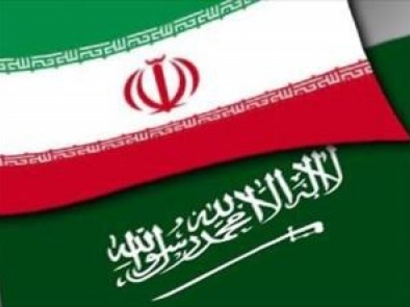As Iran and the 5+1 Powers resume nuclear talks in Vienna, the Rouhani Government has had success on another important diplomatic front.
On Tuesday, Saudi Arabia’s Foreign Minister Prince Saud al-Faisal said that Riyadh has invited Iranian Foreign Minister Mohammad Javad Zarif to visit.
“We’ll negotiate with them (Iran), we’ll talk with them,” Prince Saud said. “And our hope is that Iran becomes part of the effort to make the region as safe and as prosperous as possible and not become part of the problem.”
President Rouhani and Zarif have pursued better relations with Saudi Arabia since they came to office last summer. Seeking to defuse tensions over regional issues, the Syrian conflict, and Tehran’s nuclear program, they have sought reciprocal visits by high-level officials.
See Iran Special: Rouhani’s Opportunity for Rapprochement With Saudi Arabia?
Supreme Leader Approves Rafsanjani’s Back-Channel Talks With Saudi Arabia?
Iran welcomed the Saudi statement while saying nothing formal had been established:
DepFM AmirAbdollahian: No written invitation received from #SaudiArabia 4 FM @Jzarif 2 visit Riyadh yet, but trip on #Iran's agenda
— Meet Iran (@MeetIran) May 14, 2014
DepFM AmirAbdollahian: #Iran welcomes holding talks w #SaudiArabia 2 resolve regional problems, remove misunderstandings &promote bilat ties
— Meet Iran (@MeetIran) May 14, 2014
Zarif travelled to other Gulf States at the end of 2013, but efforts to arrange his visit or that of Rouhani to Saudi Arabia foundered on opposition within Iran and caution by the Saudis.
Earlier this month the Government made another push, with the Saudi Ambassador to Iran meeting Rouhani and former President Rafsanjani and other Iranian officials.
Rafsanjani has also served as a back-channel to Riyadh, exchanging messages with Saudi King Abdullah.
EU Spokesperson: First Session Was Useful Discussion
Michael Mann, spokesperson of Catherine Ashton, the European Union’s chief negotiator, tweeted some updates on the nuclear talks in Vienna between Iran and the P5+1 countries:
First hour-long session ended. Initial useful discussion. Now internal consultations. Talks to resume this afternoon: #IranTalksVienna
— Michael Mann (@EUHighRepSpox) May 14, 2014
Latest round of E3/EU+3 talks with #Iran on Iran's nuclear programme begin at UN, #IranTalksVienna pic.twitter.com/Z1133eMXLM
— Michael Mann (@EUHighRepSpox) May 14, 2014
#Ashton's Spox: In last round we said this round of talks will be difficult, objective in these talks to reach lasting agreement
— Iran Nuclear Energy (@nuclearenergyir) May 14, 2014
IT Firm Blocks Cyberpolice Bid to Identify Blogger
A Tehran blog-hosting service has refused to cooperate with Iran’s cyber police, FATA, and denied handing over the requested log details behind a blog.
According to the Guardian’s Saeed Kamali Dehghan, the private IT firm Bayan has ‘prompted praise among web users in Iran who see it as a rare move to uphold citizens’ rights.’
Bayan said that the information was protected by its users’ right to privacy under Iranian law, and that only when a request through a judiciary court was issued would the data be released.
Bayan’s director, Ali Ghadiri, published his response to FATA’s head, Seyed Kamal Hadianfar, and stated that Iran’s cyberspace law made it illegal for him to pass on the required information. Ghadiri emphasised the importance of user privacy and said that in order to release the blogger details “someone should file a suit and a court should be opened.”
Moscow and Tehran Discuss Energy Deals
Iran’s ambassador to Moscow, Mehdi Sanayee, and Russian Energy Minister Alexander Novak met to discuss how to further economic cooperation between the two countries.
Sanayee emphasised the importance of energy deals – notably oil and gas – hoping this would lead to economic improvement in other areas.
Prompted by upcoming meetings at the International Energy Forum (IEF), to be held on May 15th to the 16th in Moscow, Sanayee and Novak similarly discussed the building of steam power plants as well as renovating Iranian power plants.
Rouhani Says His Critics Are Corrupt
President Rouhani hit back at his hardline critics on Tuesday, “In this country, a number of people under the guise of confronting the super powers and fighting against them, stole from the people’s pockets and looted the people’s property.”
Rouhani has coupled widespread discussion of corruption in Iran with the claim that his opponents on the nuclear issue have profited from Western sanctions and want them to continue.
Responding to challenges that Iran’s nuclear negotiators are “incompatible with the independence and dignity” of the Islamic Republic, he said,
“With mere slogans we cannot achieve independence and dignity, and screams and ballyhoo will not win the country any grandeur.”
He warned that the critics “are trying to divert our nation from the path (Iranians) chose last June” by electing him as President.
Supreme Leader on Eve of Nuclear Talks: “We Cannot Be Brought to Our Knees”
The Supreme Leader has maintained a tough public line as nuclear talks with the 5+1 Powers resume in Vienna.
He told visitors from western Iran on Tuesday,
If we activate domestic potentials and concentrate on internal capabilities, the US and other powers won’t be able to take any wrong action, military or non-military, and won’t be able to cripple the Iranian nation through pressure.
The powers should know that the Iranian nation cannot be brought to its knees since it’s a lively nation and its youth are moving on the right path.
In a reference to his predecessor Ayatollah Khomenei, he added “To this day, America hasn’t been able to do a damn thing (to us)…the same goes for the other major powers, they too can’t do a damn thing. And not just militarily…socially they can’t do a damn thing (either).”
(Hat tip: Hanif Zarrabi-Kashani)

